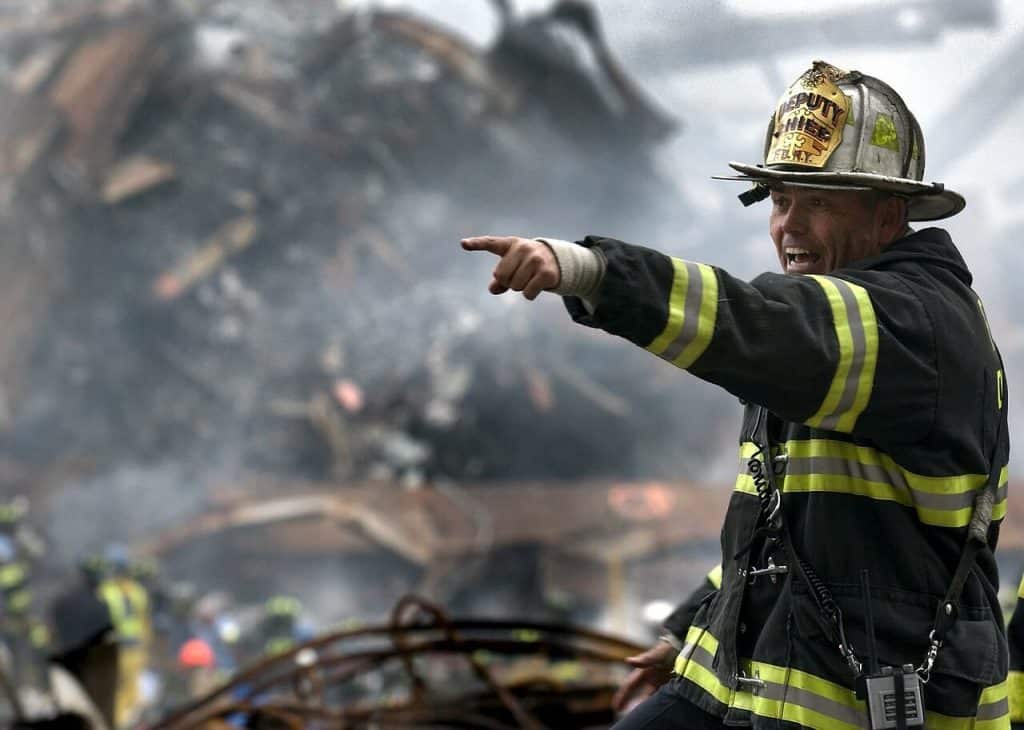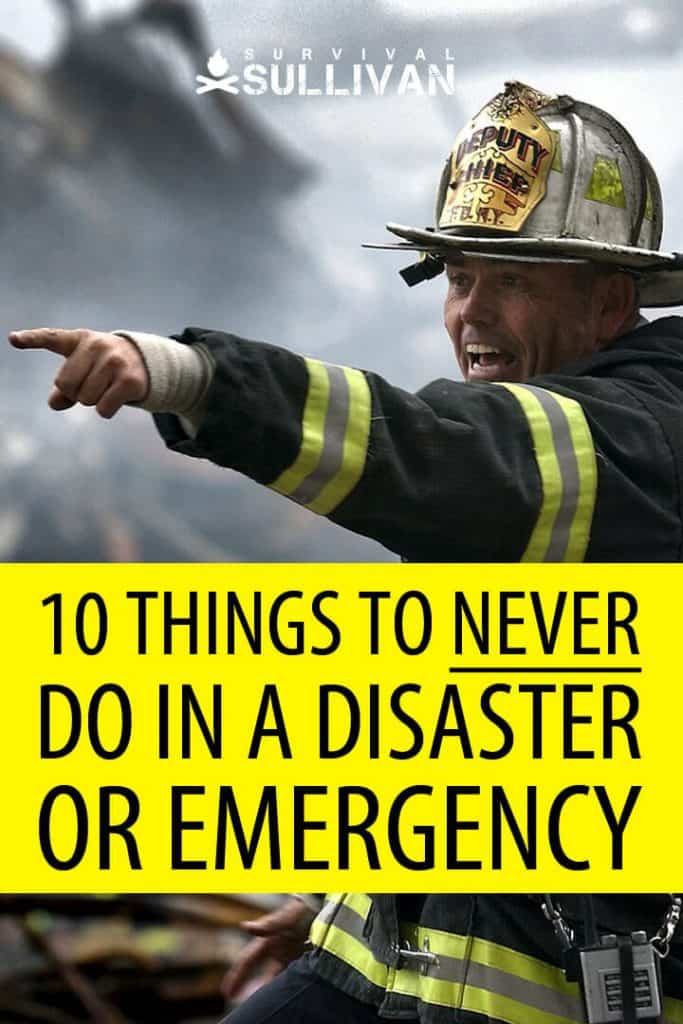The worst thing about emergencies and disasters is that they are often unpredictable. We don’t often get much warning, if any, that our life is about to hang in the balance. It can be difficult to know what to do, especially if you haven’t put much thought or practice into emergency planning prior to getting caught up in one.
But experts seem to agree on these 10 things to never do in a disaster or emergency.

#1. Don’t Panic
This was the first item on just about every mistakes to avoid or things not to do in an emergency list. For many people, their first reaction in an emergency or disaster is to panic.
Unfortunately, when you panic you can actually put yourself and your loved ones in more danger. In most disasters or emergencies, there is a very short window of time where if you are able to respond quickly and in the right way, you can prevent severe injury and maybe even save your life. So don’t panic.
#2. Don’t Underestimate the Danger
This was another of the things to never do in a disaster or emergency that most of the experts included on their lists. You’d be amazed at how many people discount weather reports or other information from authorities and convince themselves “it’s not that bad”.
Underestimating the danger in a disaster or emergency means the decisions you make won’t be based on facts. Underestimating the danger is one of the main reasons people stay put when everyone around them is evacuating.
Staying put when everyone else is evacuating means that emergency personnel may risk their lives to come in to get you later. Underestimating danger can get you, your family, and others around you injured or killed.
#3. Don’t Move Someone Who is Injured
Most of the experts agree on this one too. Unless you are a trained medical professional, never move someone who is injured. The exception would be if leaving them where they are is obviously more dangerous.
If someone is injured and still in their car for instance, you don’t move them until paramedics arrive, unless the car is on fire or filling with water. But as a general rule, never move someone who is injured until someone who is medically trained has assessed and stabilized their injuries.
#4. Don’t Try to Swim to Someone Who is Drowning
The experts down to the last one agree on this one. Never try to swim out to rescue someone who is drowning. This will be extremely difficult for parents and for most people I wager.
Your first instinct will be to go into the water to help someone who is in trouble. But when someone is drowning or even thinks they are drowning, they go into survival mode.
If you yourself are not trained in safe rescue techniques, a drowning victim can push you under or even knock you out trying to save themselves. If you can stay on land and throw them a life preserver, a branch or another object for them to hang on to while you continue to try and get help, their chances of survival are much better.
#5. Don’t Freeze Up
In an emergency the natural instinct for many people is to freeze and do nothing. As fear surges through your body, your muscles respond by tightening up, and the primitive part of your brain signals your body to stay still in hopes of not being seen.
It’s the same instinct that many animals have when they are threatened. Fighting against this natural impulse in an emergency or disaster can be a key contributing factor in saving your life. In some cases, being able to push past your fear to move quickly away from danger, can literally save your life or the life of a loved one.
#6. Don’t Fail to Think
Hormones that surge through your body when you are threatened can inhibit that part of the brain that manages higher functions, including memory.
This is why in an emergency people forget phone numbers they’ve known their whole life, forget they have a fire extinguisher just steps away, or wander aimlessly for hours after being attacked. People have been known to forget their name, their own phone number, or even give an old street address to emergency responders when they are in panic mode.
When you are threatened it’s critical that you get control fast, whether through breathing or some other technique, so that you can think about what you next actions will be.
#7. Don’t Ignore Disaster Safety Procedures
When faced with an unexpected disaster such as a hurricane, tornado, or earthquake, it’s important to know in advance how to best protect yourself. If you move to a new area or are in a new area for work or vacation, take time to find out what kinds of emergencies and disasters are prevalent for that area.
Disasters don’t always strike when you are at home. Find out what emergency evacuation plans are for the area so you and your family can be better prepared if something does happen. Seek shelter or evacuate as recommended depending on the type of disaster when it occurs.
#8. Don’t Get Caught Without Cash
In an emergency or disaster, never get caught without at least some cash on hand. In the hours or days immediately following an emergency or disaster, having cash on hand can help you get through the situation.
Even $100 in small bills can go a long way toward helping you make it through an emergency situation, especially if traditional banking is inaccessible to you or shut down.
When chaos hits, there will be more people that need help than there are people to provide help. Even good Samaritans will be torn over who to help first when resources are limited. If you have cash on hand, you may be able to purchase gasoline, water, food, or even a ride to safety when others are left stuck trying to figure out what to do.
#9. Don’t Rely on Your Cell Phone to Communicate
When a widespread emergency or disaster strikes, many, many people will panic. Their first instinct will be to use their cell phone to call emergency personnel or to get in touch with loved ones.
All of that cell phone call activity in a matter of minutes or hours, will likely overwhelm cell phone systems very quickly. And if the grid goes down cell phone towers will only work as long as their back up battery has power. Keep in mind that text messages may go through when voice calls won’t.
But, your best bet is to have an alternate way to communicate with family members or loved ones that doesn’t rely on cell phone towers or cell phones, and to have a rendezvous point in case you can’t communicate.
#10. Don’t Worry About Normal Routine Things
Experts have determined that many people worry about normal routine things during an emergency or disaster and it actually puts them at risk and in some instances, causes their injury or death.
In an emergency or disaster situation, your first priority is getting away from danger to safety. If your house is on fire or flooding rapidly, do not go back inside for your wallet, to turn the stove off, find the pet food, answer a ringing phone, etc.
Wrap-Up
Those are the 10 things to never do in a disaster or emergency. I’m sure you can think of additional ones. Share your thoughts and ideas in the comments below, and don’t forget to pin this for later on one of your Pinterest boards.


Born and raised in NE Ohio, with early memories that include grandpa teaching her to bait a hook and watching her mom, aunts, and grandmothers garden, sew, and can food, Megan is a true farm girl at heart.
For Megan, the 2003 blackout, the events of 911, and the increasing frequency of natural disasters like Hurricane Katrina, spurred a desire to be more prepared. Soon to be living off-grid, this mother of four and grandmother of ten is learning everything she can about preparedness, survival, and homesteading.

M+ I suggest carrying, in your wallet or on your person a list that indicates your blood type and any med problems, ie. diabetic, asthmatic, meds that may cause a reaction. If Catholic, the phone number of the local Pastor. Phone # of family member or friend.
Every little bit helps. Blood type would be very important if you are ever unresponsive. I also carry an EDC and a Get-Home Bag everywhere I go, in the event I am out and about when disaster strikes.
I have personally had experience with a person drowning instance. It was when I was in my my early 20’s, fit as a fiddle and strong as an Ox. My friend started having trouble swimming back to shore and was floundering in the water. I instantly jumped into the water and tried pulling him back to shore (with no life preserver, none were around). MAN what a mistake. He damned near pulled me under and I honestly feared he would drown us both! It was probably the most terrifying moment in my early life at that point. I was able to get us both to shore, but it took every ounce of strength to bring us back and keep him from drowning us both. I would never do that again after my near death experience….
A professionally-trained lifeguard would know what to do. A person who is drowning can be saved, but you MUST be trained in how to do it. If they are panicky, they are dangerous…sometimes you have to wait until they lose consciousness before you attempt their rescue. You MUST not panic yourself.
Great story, Megan, filled with valuable intel. Thanks for sharing.